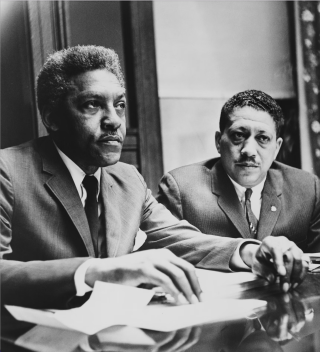Bias
Reconciling DEI With Its Roots in the Black Freedom Struggle
What is the role of psychology in realizing Bayard Rustin’s forgotten dream?
Posted February 27, 2024 Reviewed by Michelle Quirk
Key points
- Rustin believed civil rights must be followed by economic justice to achieve true freedom and equality.
- Decades later, we still see huge economic and health disparities for people identifying as Black and LGBTQ+.
- Psychologists can change attributions of inequality and join community-led campaigns for material equality.
Written by Daniel J. Mulligan, MA, and Erica D. Marshall Lee, Ph.D., on behalf of the Atlanta Behavioral Health Advocates
For most Americans, the defining moment of the Civil Rights Movement was Martin Luther King Jr.’s “I Have a Dream” speech at the March on Washington. But did you know that pivotal 1963 event, which was actually called the “March on Washington for Jobs and Freedom,” was organized in large part by a gay Black Quaker socialist named Bayard Rustin?

It’s no surprise that Black History is often whitewashed and taught poorly in America. Sadly, we didn’t hear Bayard Rustin’s story until adulthood. Despite his many talents, Rustin was forced into the background because the heteronormative culture criminalized and pathologized his gay sexual orientation.
Thanks to a Netflix biopic released last November, a new generation is being introduced to Rustin’s story. We are moved that a wider audience can celebrate his intersecting identities thanks to the successes of the Civil Rights and Gay Liberation movements he helped organize. But, unlike the 2003 documentary, the 2023 film omits much of Rustin’s life and his values. These omissions are alarming indicators of what’s missing today in psychology and the diversity, equity, and inclusion (DEI) movement.
The film ends prior to Rustin's 1966 push for the "Freedom Budget," a proposal to achieve economic justice for Black people and poor people. For Rustin, ending legalized segregation, discrimination, and disenfranchisement was inadequate to complete the Black Freedom Struggle. The Freedom Budget called for guaranteed employment, job training, living wages, universal health care and housing, and investment in public works that would disproportionately benefit Black people. The objective was to fundamentally restructure American society.
In addition to these omissions, the film minimizes the labor movement’s role and excludes Rustin’s prescient warnings about white liberals replacing collective action with psychology, moralism, and slogans. He saw how an ethos of self-expression, self-improvement, and self-flagellation was becoming a way to avoid the difficult work of building collective power and championing programs for economic justice. Unfortunately, the Freedom Budget was never enacted.
Despite heroic efforts in the past 58 years, there remain unconscionable racialized disparities. It seems history proved Rustin right. To honor this prophetic figure and the vital contributions of countless Black Americans whose names have been erased from the history books, psychologists need to take action on the structural determinants of health for people who identify as Black and LGBTQIA+.
If we truly value viewpoint diversity and equity, we cannot tokenize Rustin while canceling him for his radical commitment to redistribution and material equality.
One notable concern for Rustin was ending health disparities for Black sexual minority men (SMM). English et al. (2021) studied state-level structural racism and anti-LGBTQ policies in America. They found that, for Black SMM,
-
Both structural racism and anti-LGBTQ policies predicted higher anxiety, heavy drinking, and perceived burdensomeness (which increases suicide risk).
-
The combination of high structural racism and high anti-LGBTQ policies predicted exponentially higher heavy drinking and perceived burdensomeness.
Quinn et al. (2019) found that, compared to white SMM,
-
Black SMM use HIV pre-exposure prophylaxis (PrEP) far less and acquire HIV at five times the rate.
-
These disparities were associated with intersectional stigma combined with socioeconomic deprivation.
DEI efforts help reduce racism perpetuated interpersonally in schools and workplaces. But if we only focus there, we miss how state policies, structural racism, and socioeconomic deprivation harm Black SMM.
Relatedly, descendants of enslaved Africans face stark health disparities, including higher rates of infant and maternal mortality, chronic disease, violent victimization, trauma exposure, and serious psychological distress (Noonan et al., 2016; Roberts et al., 2011). Scholarship in the lineage of W.E.B. DuBois shows how these negative outcomes are the direct result of exploitative economic practices involved in the living racist legacies of chattel slavery, Jim Crow, the Great Migration, zoning laws, redlining, and white flight. Different theories offer different accounts of economic and cultural oppression, from the political economy of racialized inequality (Reed, 2020) to structural racism (Wien et al., 2023).
The unjust result is that Black people today have less access to quality jobs, housing, education, health care, transportation, public amenities, food, water, and air (Bailey et al., 2017). Historically segregated neighborhoods then face the structural violence of mass incarceration, police violence, and legal system discrimination, not to mention deplorable environmental conditions in which toxicant exposures, food deserts, neighborhood deprivation, and gun violence are the norm (Acevedo-Garcia et al., 2020; Currie, 2020).
If psychologists were to perfect DEI interventions and eliminate discrimination, that would still leave African Americans with these starkly unequal material conditions. Is that true equity? Rustin didn’t think so.
In fact, Rustin commented on this issue in 1970: “You can psychoanalyze every white person in the United States until he comes out pristine pure tomorrow morning, filled with love for black people—and that will not provide jobs for blacks or build housing.” This is why he helped diverse coalitions take collective action. He wanted to change the system.
What is the role of psychology?
Psychologists can approach psychological barriers to progress with curiosity, commitment, and courage. Our organizations, communities, and clients should be educated about the true extent of racialized economic inequality because Americans tend to underestimate it, especially high-income whites (Kraus et al., 2019). With national scientific education on the structural determinants of health and human development, we can show how internal attributions of inequality and belief in a just world (Garcia-Sanchez et al., 2022) are empirically wrong. By highlighting the unfairness in our society, we can increase motivation for equitable redistribution (Gonzalez et al., 2023).
Yet, we can’t substitute psychology for collective action. Health professionals know how to build relationships, communicate, and think dialectically. These skills must be applied to community organizing, national coalition building, and civic engagement. By joining community-led campaigns, we can fight for basic material safety, dignity, and equality as a human right. This must involve redistributing resources that wealthy whites have extracted from Black labor for centuries.
Again, if we truly value viewpoint diversity and equity, we cannot tokenize Rustin while canceling him for his commitment to redistribution and material equality. Instead, we can include the living legacies of Ella Baker, Angela Davis, DuBois, King, Rustin, and the untold millions who have sacrificed for this unforgotten dream.
References
Acevedo-Garcia, D., Noelke, C., McArdle, N., Sofer, N., Hardy, E. F., Weiner, M., Baek, M., Huntington, N., Huber, R., & Reece, J. (2020). Racial And Ethnic Inequities In Children's Neighborhoods: Evidence From The New Child Opportunity Index 2.0. Health Aff (Millwood), 39(10), 1693–1701. https://doi.org/10.1377/hlthaff.2020.00735
Bailey, Z. D., Krieger, N., Agenor, M., Graves, J., Linos, N., & Bassett, M. T. (2017). Structural racism and health inequities in the USA: Evidence and interventions. Lancet, 389(10077), 1453–1463. https://doi.org/10.1016/S0140-6736(17)30569-X
Currie, E. (2020). A Peculiar Indifference: The Neglected Toll of Violence on Black America. Metropolitan Books.
English, D., Carter, J. A., Boone, C. A., Forbes, N., Bowleg, L., Malebranche, D. J., Talan, A. J., & Rendina, H. J. (2021). Intersecting Structural Oppression and Black Sexual Minority Men's Health. Am J Prev Med, 60(6), 781–791. https://doi.org/10.1016/j.amepre.2020.12.022
Garcia-Sanchez, E., Correia, I., Pereira, C. R., Willis, G. B., Rodriguez-Bailon, R., & Vala, J. (2022). How Fair is Economic Inequality? Belief in a Just World and the Legitimation of Economic Disparities in 27 European Countries. Pers Soc Psychol Bull, 48(3), 382–395. https://doi.org/10.1177/01461672211002366
Gonzalez, A. M., Koepf, I., & McLean, K. C. (2023). ‘The system is unfair’: Uncontrollable attributions for inequality predict more equitable giving in adolescents. Infant and Child Development, e2418.
Gonzalez, A. M., Macchia, L., & Whillans, A. V. (2022). The developmental origins and behavioral consequences of attributions for inequality. Journal of Experimental Social Psychology, 101. https://doi.org/10.1016/j.jesp.2022.104329
Noonan, A. S., Velasco-Mondragon, H. E., & Wagner, F. A. (2016). Improving the health of African Americans in the USA: an overdue opportunity for social justice. Public Health Rev, 37, 12. https://doi.org/10.1186/s40985-016-0025-4
Quinn, K., Bowleg, L., & Dickson-Gomez, J. (2019). "The fear of being Black plus the fear of being gay": The effects of intersectional stigma on PrEP use among young Black gay, bisexual, and other men who have sex with men. Soc Sci Med, 232, 86–93. https://doi.org/10.1016/j.socscimed.2019.04.042
Reed, T. (2020). Toward Freedom: The Case Against Race Reductionism. Verso Books.
Roberts, A. L., Gilman, S. E., Breslau, J., Breslau, N., & Koenen, K. C. (2011). Race/ethnic differences in exposure to traumatic events, development of post-traumatic stress disorder, and treatment-seeking for post-traumatic stress disorder in the United States. Psychol Med, 41(1), 71–83. https://doi.org/10.1017/S0033291710000401
Wien, S., Miller, A. L., & Kramer, M. R. (2023). Structural racism theory, measurement, and methods: A scoping review. Front Public Health, 11, 1069476. https://doi.org/10.3389/fpubh.2023.1069476
Jill Rosen. Most U.S. schools teach Black history, but few do it well. Johns Hopkins University. February 10, 2021.




